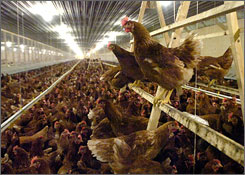.jpg) Andrew Wadge is the chief scientist for the U.K. Food Standards Agency; Andy has a blog.
Andrew Wadge is the chief scientist for the U.K. Food Standards Agency; Andy has a blog.
On Aug. 2, 2007, a Judith Hilton posted on Andy’s blog that,
"UK Government advice about cooking burgers is more stringent than in the US and we were asked to consider whether our advice was still appropriate, bearing in mind claims the cooking times and temperatures recommended in the UK may lead to overcooking and deterioration in the quality of some products.
"Mindful of this, but also of the fact that undercooked burgers can harbour harmful food bugs such as E. coli O157, which can cause food poisoning and kidney failure, and that the advice had not been expertly reviewed since 1998, we asked the ACMSF to review what we were saying, which is that burgers should be cooked to 70°C for 2 minutes or equivalent. In other words, until burgers are piping hot throughout, there are no pink bits and the juices run clear."
On Aug. 2, 2007, I posted a comment, asking,
Why is the U.K. advice considered more stringent that the U.S.? Especially when the U.K. makes no mention of using meat thermometers and instead relies on the tremendously misleading, cook until the juices run clear?
On Aug. 7, 2007, Ms. Hilton responded that,
"The stringency relates to the time-temperature combinations whereby US guidance allows combinations that will provide a lower log reduction that 70 degrees for two minutes.
The reason we don’t mention temperature probes during cooking is that they’re not commonly used in the home over here. … Sorry you don’t find the reference to juices running clear helpful. It’s there as an additional safety check, alongside cooker manufacturer’ instructions. These instructions are designed to achieve a minimum temperature of 70 degrees C for two minutes or equivalent."
 Without getting into the inadequacies on cooking instructions (and we don’t just blather about it, we’re doing research on it, rightt now — dp) I responded,
Without getting into the inadequacies on cooking instructions (and we don’t just blather about it, we’re doing research on it, rightt now — dp) I responded,
"Thanks for your comments. But they seem incomplete, especially when you are claiming that U.K. standards are more stringent than U.S. (and I’m Canadian so find the jingoism peculiar).
"The U.S. Department of Agriculture seems to have covered much of the basics in this oldie but goodie release. And while use of thermometers may be low in the U.K. and elsewhere, isn’t it the responsibility of government agencies to produce evidence-based material, and even promote best practices? Like using meat thermometers? It’s a research challenge we will be undertaking."
 Ed Murrieta writes about the doggie hospitality in the News Tribune of Tacoma, Washington.
Ed Murrieta writes about the doggie hospitality in the News Tribune of Tacoma, Washington. 
 The
The  … is give LOX a chance.
… is give LOX a chance. Food safety lawsuits continue to pile up, at home and abroad.
Food safety lawsuits continue to pile up, at home and abroad.
.jpg) Andrew Wadge is the chief scientist for the U.K. Food Standards Agency;
Andrew Wadge is the chief scientist for the U.K. Food Standards Agency;  Michael Doyle (pictured), director of the University of Georgia Center for Food Safety told Georgia’s
Michael Doyle (pictured), director of the University of Georgia Center for Food Safety told Georgia’s  The
The  Buried in a
Buried in a  UK and New Zealand researchers report in the current issue of the medical journal
UK and New Zealand researchers report in the current issue of the medical journal